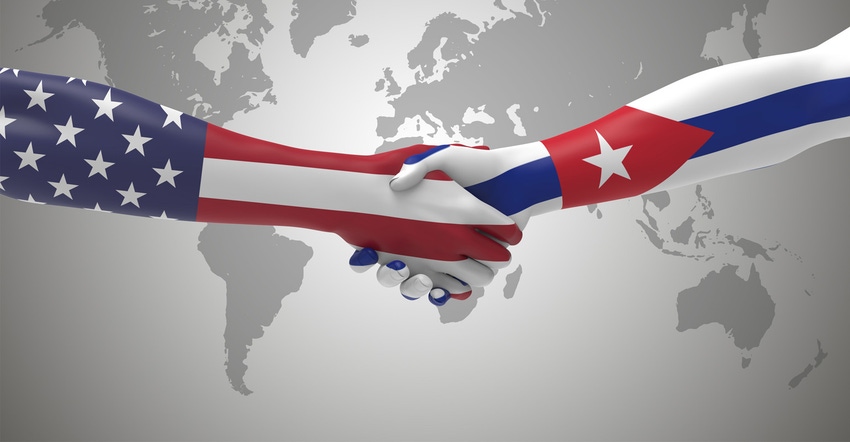October 9, 2018

According to a support group dedicated to eliminating trade barriers with Cuba, U.S. farmers and ranchers could see a $2 billion opportunity to market their products to the Island nation, and establish a path forward in normalizing relations with Cuba now that the country has a new president willing to establish a new trade deal with the United States.
“At a time when new markets are needed for our agricultural exports, Cuba is looking to increase agriculture trade and investment, and an upcoming major conference in Havana in November could help to inform and connect the people who can work to make those things happen,” said Paul Johnson, Vice-Chair of the U.S. Agricultural Coalition for Cuba (USACC).
On Nov. 8 the U.S.-Cuba Agricultural Business Conference will bring together a large gathering of representatives of both the U.S. and Cuban agricultural industries to promote open trade between the two nations. The conference is the handiwork of the USACC and its member organizations.
In recent years many U.S. farmers, livestock producers and their support groups have band together to encourage the White House and Congress to take a more active role in bringing about an acceptable resolution to current and troubling trade issues between the two nations. The USACC is comprised of individuals, companies and over 100 farm support groups including the American Farm Bureau Federation, American Soybean Association, American Seed Trade Association, American Feed Industry Association, Corn Refiners Association, the Council of State Governments, the National Association of Wheat Growers, National Association of Egg Farmers, National Barley Growers Association, National Corn Growers Association, National Council of Farmer Cooperatives, National Farmer’s Union, National Foreign Trade Council, National Grain and Feed Association, National Milk Producers Federation, National Oilseed Processors Association, National Potato Council, National Sorghum Producers — and over 80 other agriculture groups.
“U.S. rice producers could represent the largest supplier of rice to Cuba if trade relations are normalized. Similarly, Cuba does not grow wheat, and U.S. wheat growers would benefit extensively if this market were opened. Many other U.S. ag interests would see positive results if Cuba should become a destination market for the food and products we produce in the United States,” reports Johnson during an interview with Southwest Farm Press.
He says it's not just producers that would benefit for renewed and expanded trade with Cuba, but the industry at large, including major U.S. food and food processing and related companies that operate under a broad umbrella of U.S. agribusiness firms who support agricultural marketing and trade with Cuba.
“We have been advocating for normalized trade relations [with Cuba] for a long time and under the direction of Cuba's new president, Miguel Díaz-Canel Bermúdez, we believe the climate is right to discuss new and open trade relations between our two countries,” Johnson said.
Many members of Congress had the opportunity to visit with Diaz-Canel during a planned visit to Cuba two years ago, and flooded Cuba's choice for president with questions, including how he felt about the Castro-led revolution of 1959.
“I was born in 1960, after the revolution,” he told the group, according to lawmakers attending the session. “So I may not be the best person to answer that question.”
But over the past two years, Diaz-Canel has emphasized that trade for U.S. farm products would be a benefit to the people of Cuba, and to their national economy, emphasizing there would be no benefit to Cuba's military, a concern expressed by U.S. lawmakers who were skeptical to normalized relations.
“Agriculture is fundamental for both nations. For Cuba, agriculture is priority number one, two and three. It is important to the Cuban government who is struggling with a stalled economy and is looking for ways to improve the quality of life for every Cuban — they are currently importing 70 to 80 percent of their food right now from around the world,” Johnson noted.
He says their need for imported food, much of it from distant locations, provides a good opportunity to the U.S. agricultural industry. U.S. producers would benefit as would U.S. agribusiness, from equipment and material suppliers to seed and chemical companies.
“What is important is Cuba identifying an agricultural system that works for them. Obviously, there is a great advantage to working with the United States, a lot of logistical advantages. There is family and cultural ties to the United States, so there is a lot of gain by Cuba. But it would also be good for the United States to open new agricultural markets. For instance, U.S. rice producers see Cuba as potentially being the second largest market for international trade,” he said.
But perhaps of equal or greater benefit would be the sharing of knowledge. New invasive pests and weed varieties continue to challenge U.S. agriculture and many of these problems arrive in the U.S. from other countries. By opening agricultural trade with Cuba, there could be open dialogue and sharing of information and science about troublesome pests that could help to stop them before they reach U.S. shores.
To learn more about the U.S.-Cuba Agricultural Business Conference, visit https://www.uscuba-agricultureconference.com/.
To hear the full interview from USACC Vice-Chair Paul Johnson, listen to the sound file below:
You May Also Like




